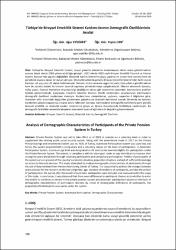Türkiye’de Bireysel Emeklilik Sistemi Katılımcılarının Demografik Özelliklerinin Analiz

View/
Access
info:eu-repo/semantics/openAccesshttp://creativecommons.org/licenses/by-nc-nd/3.0/us/Date
209-11Metadata
Show full item recordCitation
Uğur Eyidiker, Yeşim Can. Türkiye'de Bireysel Emeklilik Sistemi Katılımcılarının Demografik Özelliklerinin Analizi, Xlll. international Balkan and Near Eastern Social Sciences Congresses Series- lBANESS- , Tekirdağ/Turkey, 5-6 October 2019.Abstract
: Türkiye’de Bireysel Emeklilik Sistemi, sosyal güvenlik sisteminin tamamlayıcısı olmak üzere gönüllü katılım esasına dayalı olarak 2003 yılında yürürlüğe girmiştir. 2017 yılında 4632 sayılı Bireysel Emeklilik Tasarruf ve Yatırım Sistemi Kanunu’nda yapılan değişiklikle Otomatik Katılım Sistemi’ne geçiş yapılmış ve sistem hem zorunlu hem de gönüllülük esasına dayalı bir durum almıştır. Otomatik katılımda gönüllü Bireysel Emeklilik Sistemi’nden farklı olarak katılımcı üst yaş sınırı 45 olarak belirlenmiştir. Sistemin mikro amacına uygun biçimde; hem yıllarca gönüllü katılım hem de zorunlu katılım ile bireyler tasarruf yapmaya yönlendirilmeye çalışılmaktadır. Ülkenin ekonomik durumu, nüfus yapısı, finansal hizmetlere erişimde bilgi eksikliğinin olması gibi nedenlerle sistemdeki katılımcıların profilleri farklılık göstermektedir. Çalışmada, Emeklilik Gözetim Merkezi (EGM) verilerinden yararlanılarak katılımcıların demografik özellikleri incelemeye alınmıştır. Katılımcıların cinsiyetlerine, yaşlarına, yaşanılan il bilgilerine göre, incelenen yıllar arasındaki değişimler gözlenmeye çalışılmış ve otomatik katılımdan sonraki dönemde de katılımcı hareketleri çalışma kapsamına alınarak analiz edilmiştir. Sonuçta, katılımcıların demografik özelliklerine göre gönüllü bireysel emeklilik ve otomatik katılım sistemlerine girişte ve devam durumlarında farklılıklara rastlanmıştır. Bu demografik farklılıklar nedeniyle bireylerin sistemdeki tasarruf eğilimleri de değişiklik göstermektedir. Private Pension System was set to take effect as of 2003 to operate on a voluntary basis in order to supplement the existing public social security system. Along with the amendment made in 2017 on the Private Pension Savings and Investments System Law no. 4632 of Turkey, Automatic Participation System was launched, and hence, the system acquired both a compulsory and a voluntary nature on the basis of participation. In Automatic Participation System, maximum age limit was designated as 45 years to be deemed eligible for participation unlike the Private Pension System. The system, in compliance with its micro goal, seeks to urge individuals to increase their savings for years ahead both through voluntary participation and compulsory participation. Profiles of participants of the system vary on grounds of the country’s economic situation, population structure and lack of sufficient knowledge on access to financial services. This study attempted to analyze demographic characteristics of participants through the use of data retrieved from Pension Monitoring Center of Turkey. The study tried to address the changes between years selected for the research on the basis of gender, age, province of residence of participants, and also the actions of participants in the period after the launch of automatic participation were included and reviewed within the scope of this study. In conclusion, it was observed that there were differences in participant choices as to whether to enter into and/or to continue to remain in the private pension system and automatic participation system on the basis of demographic characteristics of participants. Besides, by virtue of demographic differences of participants, the propensity of individuals to save varies under the system.
URI
http://ibaness.org/conferences/tekirdag_fall_2019/ibaness_tekirdag_fall_proceedings_draft_4.pdfhttps://hdl.handle.net/20.500.11857/1303
Collections
The following license files are associated with this item:



















